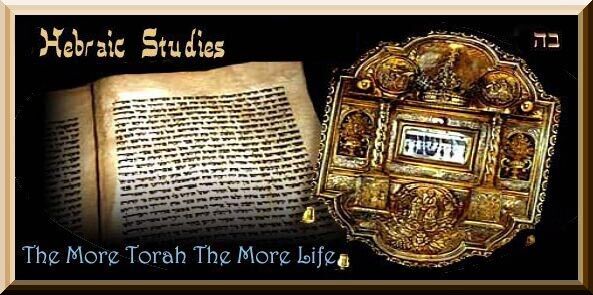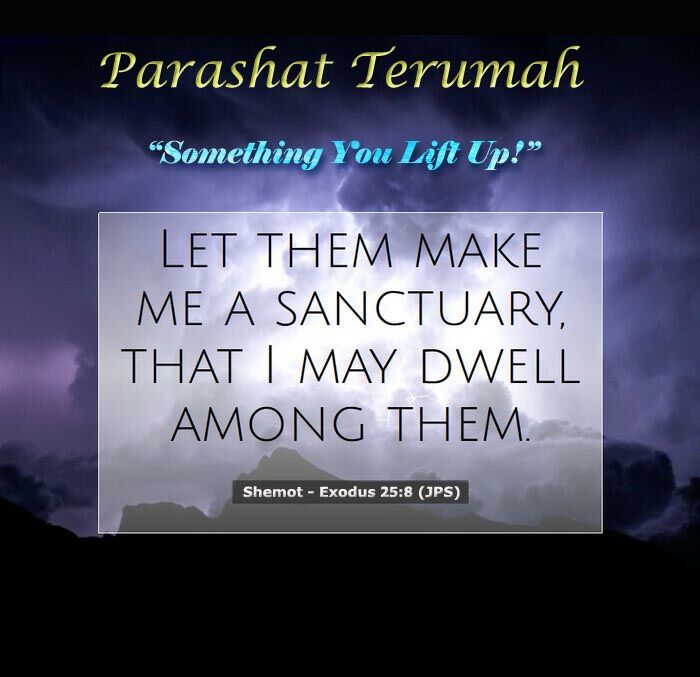
Parashat Terumah – Something You Lift Up!
Please Note: Firefox and some other Search Engines may not be suitable
Use Google Chrome for this Web Page to load perfectly!

Please do NOT
visit this site on Shabbat or on a
Please
Note: On this page I will show the four letter blessed *“Memorial
Name” of the Almighty in Ivrit - ![]() - Y-H-V-H, which
we usually pronounce as “Adonai” or “HaShem”.
At all times treat the most blessed Name with sanctity and when
we even see the Name, we should say “blessed be His
Sanctified Name.”
- Y-H-V-H, which
we usually pronounce as “Adonai” or “HaShem”.
At all times treat the most blessed Name with sanctity and when
we even see the Name, we should say “blessed be His
Sanctified Name.”
*“This is My Name forever, and this is My memorial to all generations.” Shemot - Exodus 3:15.
On this site I will mostly use a version based on the “Jewish Publication Society” Tanakh (JPS)

With Rabbi
Reuven Ben-Avraham.
It was the first Israelite house of worship,
the first home Jews made for Elohim. But the very idea is fraught
with paradox, even contradiction. How can you build a house for Elohim?
He is bigger than anything we can imagine, let alone build.
King Shlomo - Solomon made this point when he
inaugurated another house of Elohim, the
“But will Elohim in very truth dwell on
the earth? Behold, heaven and the heaven of heavens cannot
contain Thee; how much less this house that I have builded!”
Melachim Aleph - 1 Kings 8:27 (JPS version of the Tanakh).
Whilst the prophet Yeshayahu - Isaiah in the
blessed Name of Elohim stated:
“The heaven is My throne, and the earth is
My footstool; where is the house that ye may build unto Me? And
where is the place that may be My resting-place?” Yeshayahu
- Isaiah 66:1 (JPS).
Not only does it seem impossible to build a
home for Elohim. It should be unnecessary. The Elohim of
everywhere can be accessed anywhere, as readily in the deepest
pit as on the highest mountain, in a city slum or a palace lined
with marble and gold.
The answer, and it is fundamental, is that Elohim
does not live in buildings. He lives in builders. He lives not in
structures of stone but in the human heart. What the Jewish sages
and mystics pointed was that in our parsha Elohim says;
“![]() - And let them
make Me a Sanctuary, that I may dwell among them”
Shemot - Exodus 25:8 (JPS version of the Torah).
- And let them
make Me a Sanctuary, that I may dwell among them”
Shemot - Exodus 25:8 (JPS version of the Torah).
Elohim, blessed be He, might as well have said “not that I will dwell in it.”
Why then did Elohim command the people to make
a Sanctuary at all? The answer given by most commentators, and
hinted at by the Torah itself, is that Elohim gave the command
specifically after the great sin of the golden calf at Mt Sinai.
Tragically the people made the calf after Moshe
had been on the mountain for forty days to receive the Torah. As
long as Moshe was in their midst, the people knew that he
communicated with ![]() Elohim, blessed be His Sanctified Name,
and Elohim with him, and therefore Elohim was accessibly close.
But when he was absent for so long, they panicked. Who else could
bridge the gap between the people and Elohim? How could they hear
Elohim’s instructions? Through what intermediary could they
make contact with the divine presence? Not that this was any
excuse for what they did!
Elohim, blessed be His Sanctified Name,
and Elohim with him, and therefore Elohim was accessibly close.
But when he was absent for so long, they panicked. Who else could
bridge the gap between the people and Elohim? How could they hear
Elohim’s instructions? Through what intermediary could they
make contact with the divine presence? Not that this was any
excuse for what they did!
That is why Elohim said to Moshe, “Let
them build me a sanctuary that I may dwell among them.” The
key word here is the verb sh-kh-n - ![]() – ‘to dwell’. Never
before had it been used in connection with Elohim. It eventually
became a keyword of Judaism itself. From it came the word
– ‘to dwell’. Never
before had it been used in connection with Elohim. It eventually
became a keyword of Judaism itself. From it came the word ![]() –
‘Mishkan’ meaning a ‘Sanctuary’,
and ‘Shekhinah’, the ‘Divine presence’.
–
‘Mishkan’ meaning a ‘Sanctuary’,
and ‘Shekhinah’, the ‘Divine presence’.
Central to its meaning is the idea of
closeness. ‘Shakhen’ in Hebrew means a
‘neighbour’, the person who lives next door.
What the Israelites needed and what Elohim gave them was a way of
feeling as close to Elohim, blessed be He, as to a next-door neighbour.
That is what the patriarchs and matriarchs had.
Elohim spoke to Avraham, Yitzchak - Isaac and Ya’aqov - Jacob,
Sarah, Rivkah - Rebecca, Ra’Chel Rachel and Le’ah -
Leah intimately, like a friend. He told Avraham and Sarah that
they would have a child. He explained to Rivkah - Rebecca why she
was suffering such acute pain in pregnancy. He appeared to Ya’aqov
- Jacob at key moments in his life telling him not to be afraid.
That is not what the Israelites had experienced
until now. They had seen Elohim bringing plagues on the
Egyptians. They had seen Him divide the sea. They had seen Him
send manna from heaven and water from a rock. They had heard His
commanding voice at
“And they said unto Moshe: 'Speak thou with us, and we will hear; but let not Elohim, speak with us, lest we die” Shemot - Exodus 20:15 (JPS).
Elohim had appeared to them as an overwhelming
presence, an irresistible force, a light so bright that to look
at it makes you blind, a voice so strong.
So for Elohim to be accessible, not just to the
pioneers of faith, the patriarchs and matriarchs, but to every
member of a large nation, was a challenge, as it were, for Elohim
Himself. He had to do what was called tzimtzum,
“contract” Himself, screen His light, soften His voice,
hide His glory within a thick cloud, and allow the infinite to
take on the dimensions of the finite.
But that, as it were, was the easy part. The
difficult part had nothing to do with Elohim and everything to do
with us. How do we come to sense the presence of Elohim? If you
think about it, possibly it would not be so very difficult whilst
you are standing at the foot of Mount Everest or seeing the
grandeur of the
But how do you feel the presence of Elohim in
the midst of everyday life? Not from the top of
That is the life-transforming secret of the
name of the Parsha ![]() - Terumah. It means, “a contribution”
or “an offering”. For Elohim said to Moshe:
- Terumah. It means, “a contribution”
or “an offering”. For Elohim said to Moshe:
“Speak unto the children of
The best way of encountering Elohim, blessed be
He, is to give. The very act of giving flows from, or leads to,
the understanding to what we give is part of what we were given.
It is a way of giving thanks, an act of gratitude. That is the
difference in the human mind between the presence of Elohim and
the absence of Elohim.
If Elohim is present, it means that what we
have is His. He created the universe. He made us. He gave us
life. He breathed into us the very air we breathe. All around us
is His majesty, the plenitude of Elohim’s generosity: the
light of the sun, the gold of the stone, the green of the leaves,
the song of the birds. This is what we should feel when reading
the wonderful Tehillim - the Psalms we read each day during the
morning services. The world is Elohim’s art gallery and His
wonderful masterpieces are simply everywhere.
He has given us life, but if life is not
given, it is because there is no Giver, thus remember we are part
of the creation for if the universe came into existence only
because of a random fluctuation in the quantum field, if there is
nothing in the universe that knows we exist, if there is nothing
to the human body but a string of letters in the genetic code and
to the human mind but electrical impulses in the brain, if our
moral convictions are self-serving means of self-preservation and
our spiritual aspirations mere delusions, then it is difficult to
feel gratitude for the gift of life. Then there is no gift if
there is no giver. There is only a series of meaningless
accidents, and it is difficult to feel gratitude for an accident.
The Torah therefore tells us something simple
and practical, give, and you will come to see life as a
gift. You don’t need to be able to prove Elohim exists.
All you need is to be thankful that you exist – and the rest
will follow.
That is how Elohim came to be close to the
Israelites through the building of the Sanctuary. It wasn’t
the quality of the wood and metals and drapes. It wasn’t the
glitter of jewels on the breastplate of the High Priest. It
wasn’t the beauty of the architecture or the smell of the
sacrifices. It was the fact that it was built out of the gifts of
“every man whose heart maketh him willing” Shemot
- Exodus 25:2 (JPS).
The best way of scaling the spiritual heights
is simply to give in gratitude for the fact that you have been
given. Elohim, blessed be He, doesn’t live in a house of
stone. He lives in the hearts of those who give and I am not just
speaking of money, but love help, I am sure you get the picture
by now!
Shabbat Shalom.
![]()

For those who have a yearning to learn more about the Torah and grow in being a good and faithful Jew, there are many valuable studies on Hebraic Studies enter the index below. If you have any questions you are welcome to email me.
And please remember our motto seen on the logo
at the top of this page: “The More Torah, the More
Life”, for ![]() Elohim, blessed be His Sanctified Name,
is the one who gave us our Life!”
Elohim, blessed be His Sanctified Name,
is the one who gave us our Life!”
Rabbi
Return to our MAIN PAGE or go to our Main Index
?
![]()

© Copyright - 1989 - 2022 © hebraicstudies - All rights reserved